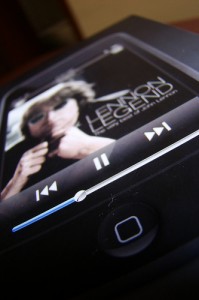Monday Apple put up a teaser page about an iTunes announcement for Tuesday. As always, the crowd goes wild. Many expect Apple to finally announce a cloud-based music library, probably using the new data center in my home state. But the rumors of the Beatles library finally coming to iTunes swirled a bit more, and were finally confirmed by the WSJ before bedtime here in the US.
The crowd went wild again, but now with the vitriol that is solely reserved for politics and Apple Inc. announcements.
But to a few of us, this was a big deal.
The technology company Apple Computer/Apple Inc. and the Beatles media company Apple Corps have a long history due not just to the shared name, but also to some shared values and customers. The foundations of Apple Computers are in the counterculture movement of the 1970s and 1980s that so loved the Beatles. Steve Jobs’ recent ups and downs with AT&T over the iPhone aren’t the first time he has faced the telecom giant; some of the friendship that were forged between Jobs and Steve Wozniak was based on building “Blue Boxes” used to hack the phone system. Jobs has consistently displayed an affinity for much of the ethics and practices of that time.
So we get to the naming of the company. The Apple Museum page on this subject leaves the naming a bit ambiguous, but mentions a tribute to the Beatles record company as being a possibility. I don’t think Jobs or any of the other Apple founders have ever confirmed that the company was named in honor of the record company, but I think it’s fair to guess that it had some influence. I could drag on and on with clips and quotes that point to the Steves being Beatles fans, but I’ll just toss out a few quick ones.
When Wozniak went back to school in the early 80s he enrolled with the name “Rocky Racoon Clark” to help minimize the problems his fame would cause. John Lennon (with Yoko) were in one of the images from the “Think Different” ad campain from 1997 (right after Jobs’ return). One of John Lennon’s records was featured on the box art for the iPod Touch.  And the below video from 60 minutes clearly shows the Beatles’ influence on Jobs.
And the below video from 60 minutes clearly shows the Beatles’ influence on Jobs.
Steve Jobs talks about Beatles/Teamwork
All of this is really to establish that the now bigger company, Apple Inc., was started by a couple of Beatles fans, who certainly had no intention of the name harming the record company. Now on to the legal issues.
Apple Corps started as little more than a tax shelter for the Fab Four. As the song “Taxman” makes clear, the band wasn’t a big fan of how much of their money had to be given to the UK government. It turned out that by establishing a corporation they could get a lower tax rate on their music earnings. Paul McCartney is credited for coming up with the name, a phonetic wordplay on “apple core.” In the meantime they had to have this company do something to justify its existence. They originally just planned to sell some retail merchandise, and later decided to help struggling artists. Eventually the company became a bit more serious, and handled much of the Beatles’ business (which is a lot by itself) and also functioned as a full blown record label and recording studio for a few acts.
Nine years later, Apple Computer was founded. According to the Apple Museum, Wozinak was concerned that the name would be trouble. Sure enough, Apple Corps didn’t wait long and filed suit against Apple Computer in 1978. The two settled in 1981, with Apple Computer paying Apple Corps a mere $80,000, and a condition that Apple Computer wouldn’t enter the music business, and Apple Corps wouldn’t enter the computer business. It is important to keep in mind that computing in 1981 was a far cry from the multimedia world it is today. Until the early-mid 90s the concept of computer music was heavily tied to midi bleeps and squeals.
In 1986, Apple Corps sued Apple Computer again, this time because of some significant MIDI and audio hardware and capabilities added to one of the Apple II computers, stating that this was against the 1981 agreement. Apple Computer had to cough up a much more considerable amount of money to settle with Apple Corps again in 1991 when Mac OS recieved a sound sampling system. The system was originally called Chimes but was later renamed “Sosumi” as a play on the phrase “so sue me.”
Finally, in 2003, Apple Corps sued Apple Computer for the iTunes store. The fact that the computer store was now distributing music led many (myself included) to wonder if Apple Corps might have a bit of a stronger argument in court. I’m no lawyer, but I expect the wording of the 1991 settlement had a lot to do with Apple Computer surviving this one. A CNet article from the 2003 dispute quotes the 1991 ruling:
Apple Computer was allowed to use its brand on “goods or services…used to reproduce, run, play or otherwise deliver such content,” as long as it was not on physical media such as a CD.
The concept of a portable music player that stored its content digitally on a hard disk or solid state memory was a far off thought in 1991, when portable CD players like the Discman had just started to become common. However, the above statement seems to pretty strongly allow selling music through iTunes, and playing it on a computer or iPod. Apple Computer won this battle, and Apple Corps appealed. In the meantime, Apple Computer became Apple Inc.
In February 2007, Apple Inc. and Apple Corps announced that an agreement had been reached. No money for legal costs exchanged hands, but the trademarks related to “Apple” were handed over to Apple Inc., with Apple Inc. licensing use of the trademark back to Apple Corps. This led many observers to think that the Beatles would soon be on iTunes. The Beatles were one of very few popular artists not on the iTunes store, and all four of the Beatles’ solo works were on iTunes. McCartney even did an iTunes + iPod silhouette video in 2007. But it didn’t happen for almost 4 years…
The rumors came up again and again, just like the iPhone and iPad before. They heated up quite a bit in the summer of 2009 when the Beatles music was released in digital form for the first time with the Rock Band Beatles game, and the remastering and re-release of the entire catalog seemed like a perfect time to release the music on iTunes. Paul McCartney was even quoted as saying he wanted it to happen, but things were hung up on the business side (involving EMI). Additionally there were rumors and vague reports that indicated Yoko Uno wasn’t doing the best job of working with Apple Inc.
So here we are, with the Beatles finally on iTunes. As I mentioned at the beginning, much of the Apple faithful were disappointed that Apple “hyped” this event. By that they mean the front page ad that only showed up one day before the announcement. There weren’t ads or teasers or a keynote speech. To those of us that have followed this saga for years and like to show our support for music we care about, it seems like it was worth even more hype.
Header photo credit: Gabriel Alves (Creative Commons)
Much of the content of this article is sourced from Wikipedia, in particular the Apple v. Apple page.






